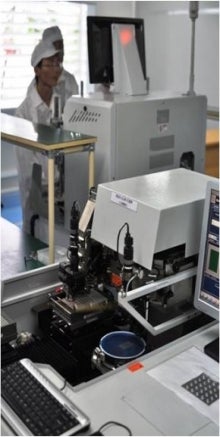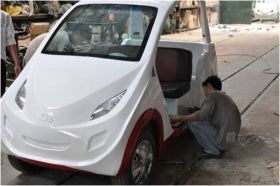 We raised glasses and cheered to the future success of Mr. Minh’s company. I had just visited his manufacturing facility where his company ASAMLED produces light-emitting diode (LED) lights for a variety of applications. A 40 person start-up and the only LED lighting company to manufacture over 90% of the final product locally, ASAMLED had the makings of Vietnamese clean tech success story. But as the day rolled on, we began discussing the real challenges the company and industry face. Starting an energy efficiency business in a country where energy is cheap and Chinese importers (who he called ‘screw-driver innovators’) are plenty, is not easy.
We raised glasses and cheered to the future success of Mr. Minh’s company. I had just visited his manufacturing facility where his company ASAMLED produces light-emitting diode (LED) lights for a variety of applications. A 40 person start-up and the only LED lighting company to manufacture over 90% of the final product locally, ASAMLED had the makings of Vietnamese clean tech success story. But as the day rolled on, we began discussing the real challenges the company and industry face. Starting an energy efficiency business in a country where energy is cheap and Chinese importers (who he called ‘screw-driver innovators’) are plenty, is not easy.
He told me how ASAMLED was conducting market tests with dragonfruit farmers. Using LEDs at night, dragonfruit production could jump from four harvests a year to nine – good news for the Vietnamese farmers who supply 40% of the fruit’s market in Europe. But he explained research like this was expensive and difficult to do with limited resources. According to him, the World Bank-run Climate Innovation Center could help him advocate his technology, inform consumers and access funding to market test a host of new LED applications.

His market? Anything from ginseng farmers on rocky terrain to commercial buildings wanting to green their roofs. But before I got myself too convinced by his impassioned pitch, he noted the range of problems he was having in accessing finance to scale-up production, getting introduced to the right partners and a host of other constraints that were complicating his route to the market. Quang is an ideal beneficiary of infoDev’s Climate Innovation Center (CIC) in Vietnam. The technology commercialization and venture financing services provided by the CIC would be crucial to get this relatively simple, but impactful climate adaptation solution marketable and into production.
The next day I took the hydrofoil to visit the factory of an entrepreneur Randy designing and manufacturing electric cars. Vietnam has a roughly 100% tax on car imports. After doing the math, Randy saw a market opportunity in building low-cost, Vietnamese-made electric cars with modular designs. Inspired by Apple, Lego and Ikea, Randy sees a future where simple, stylish and affordable electric cars show up at your doorstep in a flat pack, with a screwdriver and an instruction manual (for those who aren’t good with DIY projects or putting together Ikea furniture, I suggest sticking to the assembled version).
 Right now, Randy has more orders than he can fill but without the US$100k financing he needs to turbo-charge his production, deliveries will remain modest. Randy makes 80% of his generation 1 and 2 models from local suppliers but he needs to source quality components. To date, finding suppliers has been mostly by trial and error. Randy’s sales office is no more than a whiteboard with handwritten orders at this point. But he’s dreaming big with a host of new models in the pipeline and the capacity to build 100 cars a month. Now he just needs the relatively modest funding to get there.
Right now, Randy has more orders than he can fill but without the US$100k financing he needs to turbo-charge his production, deliveries will remain modest. Randy makes 80% of his generation 1 and 2 models from local suppliers but he needs to source quality components. To date, finding suppliers has been mostly by trial and error. Randy’s sales office is no more than a whiteboard with handwritten orders at this point. But he’s dreaming big with a host of new models in the pipeline and the capacity to build 100 cars a month. Now he just needs the relatively modest funding to get there.
Entrepreneurs and visionaries like Minh, Quang and Randy are part of the growing clean tech revolution in Vietnam. They have the will, but not necessarily the means to make their dreams a reality. Whether it’s market development, access to commercialization support or the critical need for seed-stage finance, these services are currently limited or non-existent in Vietnam. The Climate Innovation Center in Vietnam has been designed specifically to support these unmet needs and its launch early next year couldn’t happen soon enough.


Join the Conversation